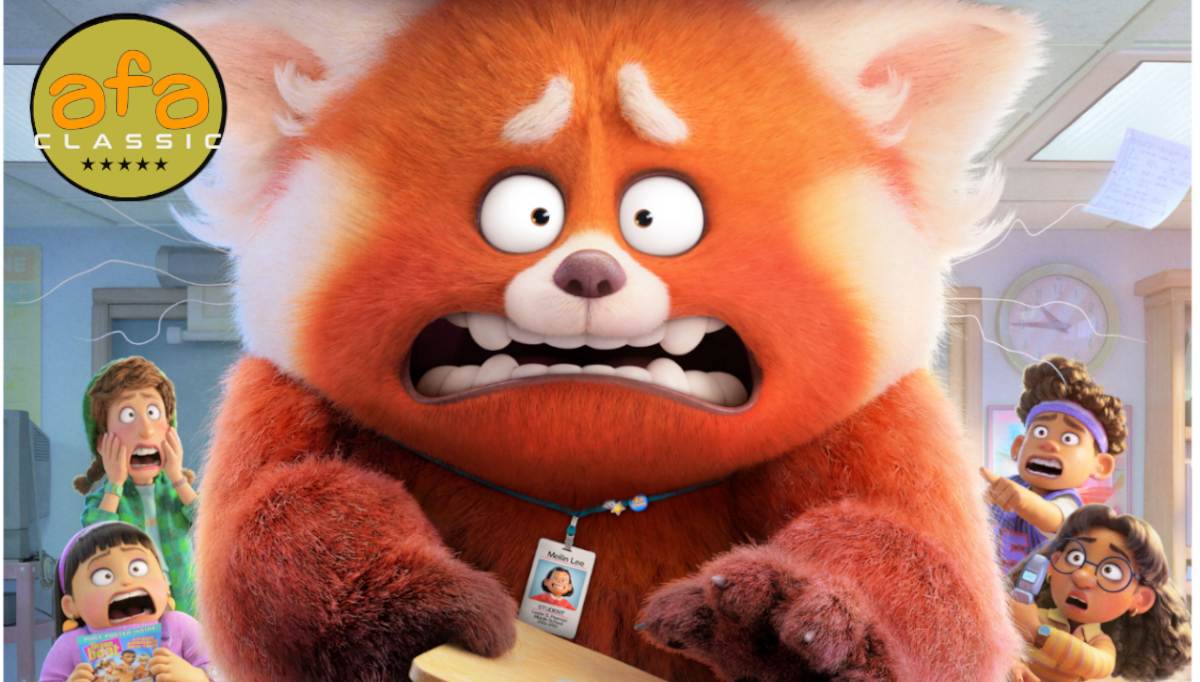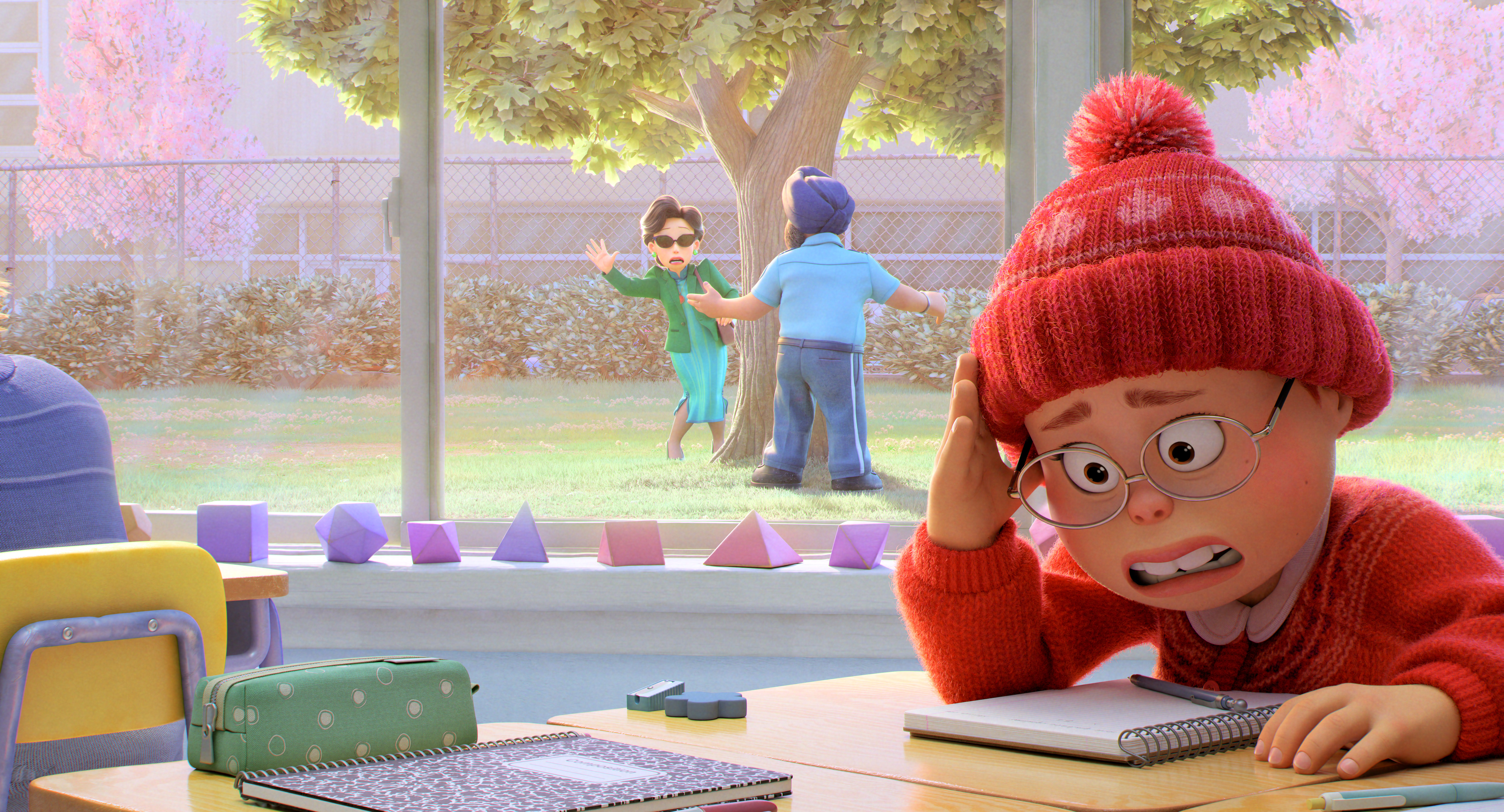Turning Red (2022)
Pixar's newest feature Turning Red deals with the challenges of adolescence, and the world-renowned studio has had some growing pains of its own. After an unprecedented run of critical and box-office successes, they hit a bit of a rough patch which saw an abundance of sequels and prequels. Now, the studio seems to have entered a new era. Under the leadership of new Chief Creative Officer Pete Doctor, there's been a move towards less sequels and more originals, many of them helmed by first-time directors.
Turning Red is the debut feature from Domee Shi, director of the
Oscar-winning short Bao. It's the first Pixar film to have been
solo-directed by a woman (Brenda Chapman is credited as a director on
2012's Brave, although she left partway through production) and the
first by a woman of colour. Shi co-wrote the screenplay with Julia Cho
(Fringe, Halt and Catch Fire) and the film is produced by
Lindsey Collins. In January 2022 it was announced that Turning Red
would follow in the footsteps of Soul and Luca and skip cinemas
in favour of streaming on Disney Plus from March 11 (the date it was
due to be released theatrically).
The film introduces us to Meilin Lee, a 13-year old girl growing up in
Canadian city Toronto in the early 2000s. She is academically gifted, geeky, ambitious, confident and goofy, spending her free time hanging out with her
loyal "ride or die" friends or being the dutiful daughter to her loving but
overprotective mum, Ming. One fateful day she discovers that she has
inherited a family curse that causes the women of her family to turn into a
giant red panda whenever they get too emotional. Which when you're 14, tends to be quite often. Can she learn to keep the
panda under control while dealing with the usual foibles of teenage life such
as crushes, schoolwork and embarrassing parents? And more importantly, can she
and her friends make it to the concert of their current and all-consuming
obsession, boyband 4*Town?
Turning Red is a very different kind of Pixar film. We have had some sort of
exploration of teenage life through Violet Parr in the
Incredibles films, and Inside Out's Riley is on the cusp of her teen years. But we have never had a Pixar film that has centred this much on
an adolescent character, let alone a teenage girl. The fact that the film is
written and directed by women is very important here, giving it an air of
authenticity, despite taking place in a very cartoony world. It goes to places
you would never expect to see in a Disney Pixar film. Early on, Ming mistakes
Mei's first panda transformation for the arrival of her first period, leading
to a sequence that is very funny indeed.
The panda curse is pretty obviously a metaphor for puberty. It's a time we all
experience changes in our body and in ourselves and can often feel like we're
not quite sure who we are. Mei's panda turns this into a literal
transformation. It means that the story is very relatable to anyone who has
gone through- or is currently going through- it themselves.
But let's not get too ahead of ourselves, even before the panda shows up,
Mei's life feels very true to what it feels like to be that age. Friendships
that feel so vital, the sheer burning fire of embarrassment and the intensity
of your first obsessions (in this case 4*Town). Everyone's experience is
different, and girls have a different experience to boys in a lot of ways. But
it's likely, whatever gender you are, wherever and whenever you grew up,
there's likely to be something here that feels incredibly familiar.
At the same time, it very much does take place in a very specific time and
place. It's very specific in fact to Shi's own childhood- she grew up in
Toronto and was Mei's age in 2002, the year the film takes place. It's not
radically different to any other North American city, but there are things
that definitely identify it as Toronto, such as the iconic
CN Tower which is often seen in the background, and the Sky Dome stadium featured
in the film is also real, as are many of the other locations such as China Town. No doubt anyone
who is familiar with the city will be able to spot more references and places, as well
as plenty of easter eggs for Canadian viewers.
It's also specific to the experience of the Chinese diaspora. It's full of
culturally specific elements both traditional (such as the statues found in
the Lee's family's temple) and more modern (such as the Chinese TV dramas Ming
watches). Mei's relationship with her mother also feels like it has a cultural
aspect to it too. Ming's overprotective nature and her efforts to shape Mei's
life seems to conform with stereotypes. But there is never any doubt about how
much she loves her, and it is eventually revealed that she has a very good
reason to be how she is, and never feels like she strays into the "tiger mum'
stereotype. The mother-daughter relationship is the very heart of this story. Mei's dad is a lot quite than his wife, but he's just as supportive as she is. He's the family's rock. And boy, the food he makes sure looks delicious!
Also key to everything is Mei's close group of friends. The film deliberately stays
away from the 'mean girl' cliche to show a positive view of a female
friendship. Mei's mates are loyal, caring and always have her back. They're
also all great characters in their own right, with distinctive characters,
meaning that despite their limited screen time they make an impression.
Pint-sized Korean-Canadian firecracker Abby is particularly funny.
The decision to set it in the noughties, specifically 2002 (as revealed in a
calendar seen on screen) also leads to a lot of fun stuff. Anybody who is old
enough to remember living through that era will recognise the
period-appropriate fashion. Look out for Tamagotchis, Nokia 3310 and
flip phones, friendship bracelets, overhead projectors, and other touches that
help it nail the time period. Millennial viewers will have an absolute blast
with it.
Visually, Turning Red is an absolute treat. Pixar films have been embracing
stylisation more lately and Turning Red continues this trend. The character
designs have a wonderfully cartoonish aspect to them, using an aesthetic Shi describes as "Chunky Cute". It's a perfect way to describe the style as the
characters have a stop-motion like weight to them that gives them such
charm.
And then there's the panda herself, who iust may be the cutest thing ever in a
Pixar film. Covered in fuzzy fur you can virtually feel, it's a masterful
piece of appealing design work. She's also probably the closest thing western animation
has to its own Totoro (not counting the toy Totoro that crops up in the
Toy Story series) and is going to sell a mountain of plushes. The transformation sequences are also beautifully
done, as Mei "poofs" in and out of panda form.
The designs are complemented with the animation style, which is also different
from earlier Pixar films and shorts. It's got a manic energy to it, with
kinetic animation dynamic camera work and snappy editing. It suits its main character down
to the ground. If anything, the animation's style is closer to
The Mitchells Vs The Machines than any other Pixar movie (although its approach is a
little more traditional).
The backgrounds and set designs are also first-rate and also continue the chunky cute aesthetic. The colours have a slightly muted and pastel look to
them. The washed-out look helps the characters- who have much brighter primary colours-
really pop.
The voice cast is universally excellent, with newcomer
Rosalie Chiang doing sterling work in the lead role and is ably
supported by Ava Morse, Hyein Park and Priya as her friends.
Sandra Oh (of Killing Eve and Gray's Anatomy fame) is also excellent as Ming,
bringing a real sense of warmth to a character who could have easily strayed
into character. Orion Lee doesn't get too many lines as Mei's dad Jin, but
what he does with the few lines he has, is extremely effective. Listen out too
for respected Chinese actors James Hong and
Ho-Wai Chin who crop us later in pivotal roles.
Billie Eilish and Finneas wrote three songs for 4*Town and they very much sound like something a noughties boyband would release. Whether that's a good thing or not will depend on your personal musical tastes.
It's understandable that the filmmakers may be upset over the switch to a
streaming release for this film. It might seem that this film is inherently
less 'cinematic', but this would still be amazing to see on a big screen. The
climax does get surprisingly big, though.
No matter what screen you get to see it on won't change the fact that Turning
Red is an incredible debut for Domee Shi. It's beautifully made, sharply written and just as instantly lovable as it is adorable (and adorkable) as its big fuzzy lead.
★★★★★
*Advance screener provided by Disney*






























